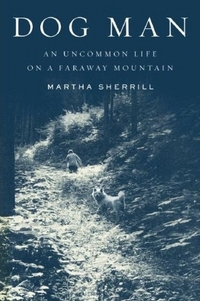

Purchase
An Uncommon Life on a Faraway Mountain
Penguin
March 2008
On Sale: February 28, 2008
256 pages
ISBN: 1594201242
EAN: 9781594201240
Hardcover
Add to Wish List
Non-Fiction Biography
How one man's consuming passion for dogs saved a
legendary breed from extinction and led him to a difficult,
more soulful way of life in the wilds of Japan's remote snow
country
As Dog Man opens, Martha
Sherrill brings us to a world that Americans know very
little about-the snow country of Japan during World War II.
In a mountain village, we meet Morie Sawataishi, a fierce
individualist who has chosen to break the law by keeping an
Akita dog hidden in a shed on his property.
During
the war, the magnificent and intensely loyal Japanese
hunting dogs are donated to help the war effort, eaten, or
used to make fur vests for the military. By the time of the
Japanese surrender in 1945, there are only sixteen Akitas
left in the country. The survival of the breed becomes
Morie's passion and life, almost a spiritual calling.
Devoted to the dogs, Morie is forever changed. His
life becomes radically unconventional-almost preposterous-in
ultra-ambitious, conformist Japan. For the dogs, Morie
passes up promotions, bigger houses, and prestigious
engineering jobs in Tokyo. Instead, he raises a family with
his young wife, Kitako-a sheltered urban sophisticate-in
Japan's remote and forbidding snow country.
Their
village is isolated, but interesting characters are always
dropping by-dog buddies, in-laws from Tokyo, and a barefoot
hunter who lives in the wild. Due in part to Morie's
perseverance and passion, the Akita breed strengthens and
becomes wildly popular, sometimes selling for millions of
yen. Yet Morie won't sell his spectacular dogs. He only
likes to give them away.
Morie and Kitako remain in
the snow country today, living in the traditional Japanese
cottage they designed together more than thirty years
ago-with tatami mats, an overhanging roof, a deep bathtub,
and no central heat. At ninety-four years old, Morie still
raises and trains the Akita dogs that have come to symbolize
his life.
In beautiful prose that is a joy to read,
Martha Sherrill opens up the world of the Dog Man and his
wife, providing a profound look at what it is to be an
individualist in a culture that reveres conformity-and what
it means to live life in one's own way, while expertly
revealing Japan and Japanese culture as we've never seen it
before.
Comments
No comments posted.
Registered users may leave comments.
Log in or register now!
| 


 © 2003-2025 off-the-edge.net
all rights reserved Privacy Policy
© 2003-2025 off-the-edge.net
all rights reserved Privacy Policy